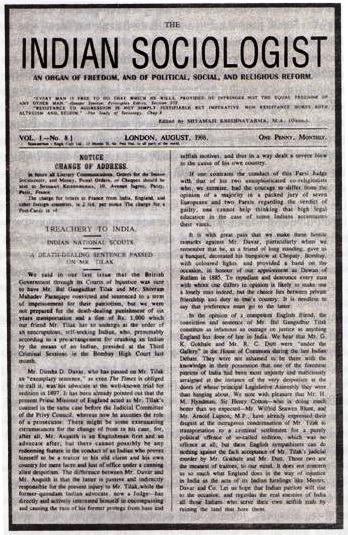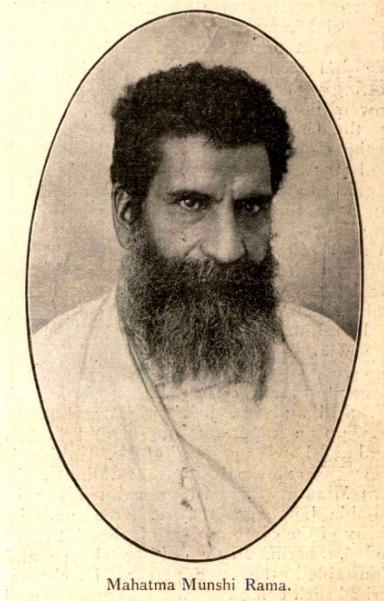|
Dayananda Saraswati
Dayanand Saraswati () born Mool Shankar Tiwari (12 February 1824 – 30 October 1883), was a Hindu philosopher, social leader and founder of the Arya Samaj, a reform movement of Hinduism. His book '' Satyarth Prakash'' has remained one of the influential texts on the philosophy of the Vedas and clarifications of various ideas and duties of human beings. He was the first to give the call for '' Swaraj'' as "India for Indians" in 1876, a call later taken up by Lokmanya Tilak.Aurobindo Ghosh, ''Bankim Tilak Dayanand'' (Calcutta 1947, p. 1) "Lokmanya Tilak also said that Swami Dayanand was the first who proclaimed Swaraj for Bharatpita i.e. India." Denouncing the idolatry and ritualistic worship, he worked towards reviving Vedic ideologies. Subsequently, the philosopher and President of India, S. Radhakrishnan, called him one of the "makers of Modern India", as did Sri Aurobindo. Those who were influenced by and followed Dayananda included Chaudhary Charan Singh, Madam Cama, ... [...More Info...] [...Related Items...] OR: [Wikipedia] [Google] [Baidu] |
Arya Samaj
Arya Samaj () is a monotheistic Indian Hindu reform movement that promotes values and practices based on the belief in the infallible authority of the Vedas. Dayananda Saraswati founded the samaj in the 1870s. Arya Samaj was the first Hindu organization to introduce proselytization in Hinduism. Etymology "''Arya Samaj''" is a compound Sanskrit term consisting of the words "''arya''" and "''samaj''." The term "''arya''" refers to an individual who possesses virtuous attributes and noble characteristics, whereas "''samaj''" denotes a social group or organized community. Therefore, the term "''arya samaj''" refers to a community of individuals of high moral character. History The beginning Swami Dayanand Saraswati established the Arya Samaj in April 1875 in Bombay with ten principles. However, these principles were finally settled in 1877 in Lahore. Vedic schools Between 1869 and 1873, Dayanand began his efforts to reform orthodox Hinduism in India. He established '' G ... [...More Info...] [...Related Items...] OR: [Wikipedia] [Google] [Baidu] |
Kanada (philosopher)
Kanada may refer to: *Kaṇāda, the Hindu sage who founded the philosophy of Vaisheshika *Kanada (family of ragas), a group of ragas in Hindustani music *Kanada (surname) *Kanada Station, train station in Fukuoka, Japan *Canada, a country in North America (as it is spelled in many languages) *Kanada warehouses, Auschwitz, storage facilities in Auschwitz for looted property *Kanada (treehopper), ''Kanada'', a genus of treehopper See also *Canada (other) *Kannada (other) *Kaneda, a Japanese surname *Kanata (other) *Kanhar (other) {{disambiguation ... [...More Info...] [...Related Items...] OR: [Wikipedia] [Google] [Baidu] |
Madan Lal Dhingra
Madan Lal Dhingra (18 September 1883 – 17 August 1909) was an Indian student and a revolutionary freedom fighter at University College London who in 1909 assassinated Sir William Hutt Curzon Wyllie, the political aide-de-camp to the Secretary of State for India, in London. Early life Madan Lal Dhingra was born on 18 September 1883 in Amritsar, India, in an educated and affluent Hindu Punjabi Khatri family. His father, Dr. Ditta Mal Dhingra, was a civil surgeon, and Madan Lal was one of eight children (seven sons and one daughter). All seven sons, including Dhingra, studied abroad. Dhingra studied at Amritsar in MB Intermediate College until 1900. He then went to Lahore to study at the Government College University. Here, he was influenced by the incipient nationalist movement, which at that time was about seeking Home Rule rather than independence. Dhingra was especially troubled by the poverty of India. He studied the literature concerning the causes of Indian poverty ... [...More Info...] [...Related Items...] OR: [Wikipedia] [Google] [Baidu] |
Lala Hardayal
Lala Rudra Dayal Mathur ( Punjabi: ਲਾਲਾ ਹਰਦਿਆਲ; 14 October 1884 – 4 March 1939) was an Indian nationalist revolutionary and freedom fighter. He was a polymath who turned down a career in the Indian Civil Service. His simple living and intellectual acumen inspired many expatriate Indians living in Canada and the U.S. in their campaign against British rule in India during the First World War. Biography Har Dayal Mathur was born in a Hindu Mathur Kayastha family on 14 October 1884 at Delhi. He studied at the Cambridge Mission School and received his bachelor's degree in Sanskrit from St. Stephen's College, Delhi and his master's degree also in Sanskrit from Punjab University. In 1905, he received two scholarships of Oxford University for his higher studies in Sanskrit: Boden Scholarship, 1907 and Casberd Exhibitioner, an award from St John's College, where he was studying. He moved to the United States in 1911, where he became involved in industrial u ... [...More Info...] [...Related Items...] OR: [Wikipedia] [Google] [Baidu] |
Vinayak Damodar Savarkar
Vinayak Damodar Savarkar (28 May 1883 – 26 February 1966 ), was an Indian politician, activist and writer. Savarkar developed the Hindu nationalist political ideology of Hindutva while confined at Ratnagiri in 1922. The prefix "Veer" (meaning 'brave') has been given by himself, when he penned his own biography under the pseudonym Chitragupta. He was a leading figure in the Hindu Mahasabha. Savarkar began his political activities as a high school student and continued to do so at Fergusson College in Pune. He and his brother founded a secret society called Abhinav Bharat Society. When he went to the United Kingdom for his law studies, he involved himself with organizations such as India House and the Free India Society. He also published books advocating complete Indian independence by revolutionary means. One of the books he published called '' The Indian War of Independence'' about the Indian Rebellion of 1857 was banned by the British colonial authorities. In 1910, ... [...More Info...] [...Related Items...] OR: [Wikipedia] [Google] [Baidu] |
Shyamji Krishna Varma
Shyamji Krishna Varma (1 October 1857 – 30 March 1930) was an Indian revolutionary fighter, an Indian patriot, lawyer and journalist who founded the Indian Home Rule Society, India House and '' The Indian Sociologist'' in London. A graduate of Balliol College, Krishna Varma was a noted scholar in Sanskrit and other Indian languages. He pursued a brief legal career in India and served as the ''Divan'' of a number of Indian princely states in India. He had, however, differences with Crown authority, was dismissed following a supposed conspiracy of British colonial officials at Junagadh and chose to return to England. An admirer of Dayanand Saraswati's approach of cultural nationalism, and of Herbert Spencer, Krishna Varma believed in Spencer's dictum: "Resistance to aggression is not simply justified, but imperative". In 1905, he founded the India House and '' The Indian Sociologist'', which rapidly developed as an organised meeting point for radical nationalists among Indi ... [...More Info...] [...Related Items...] OR: [Wikipedia] [Google] [Baidu] |
Swami Shraddhanand
Munshi Ram, better known as Swami Shraddhanand (22 February 1856 – 23 December 1926) was an Indian independence activist and Arya Samaj sannyasi who propagated the teachings of Dayananda Saraswati. This included the establishment of educational institutions, like the Gurukul Kangri University, and played a key role on the ''Sangathan'' (consolidation and organization) and the '' Shuddhi'' (purification), a Hindu reform movement in the 1920s. Early life and education He was born on 22 February 1856 in the village of Talwan in the Jalandhar District of the Punjab Province of India. He was the youngest child in the family of Lala Nanak Chand, who was a Police Inspector in the United Provinces (now Uttar Pradesh), then administered by the East India Company. His given name was Brihaspati Vij, but later he was called Munshi Ram Vij by his father, a name that stayed with him till he took sanyas in 1917, variously as Lala Munshi Ram Vij and Mahatma Munshi Ram. He adopted ath ... [...More Info...] [...Related Items...] OR: [Wikipedia] [Google] [Baidu] |
Pandit Lekh Ram
Pandit Lekh Ram (April 1858 – 6 March 1897) was a 19th-century social reformer, publicist, and writer from Punjab, India. He was the leader of the radical wing within the Arya Samaj, an Indian Hindu reform movement. He was known for his criticism of the caste system, superstitions, and blind faith prevalent in Hindu society. He also advocated for the education and empowerment of women. He is also known particularly for his encounters with Mirza Ghulam Ahmad, the founder of the Ahmadiyya movement, and as a subject of his death prophecy. Lekh Ram's outspoken views and writings made him a controversial figure, and he faced opposition and violence from conservative Hindus and Muslims. His assassination by an unidentified assailant on 6 March 1897 Early life Pandit Lekh Ram was born in April 1858 in a small village of Pindi Saidpur, Jhelum District. His father's name was Tara Singh and his mother was Bhag Bhari. He served in the Punjab Police for some years, and when posted at ... [...More Info...] [...Related Items...] OR: [Wikipedia] [Google] [Baidu] |
Madam Cama
Bhikhaiji Rustom CamaBhi''ai''- (with aspirated ''-kh-'') is the name as it appears in the biographies. Another common form is Bhi''ai''- (with unaspirated ''-k-''), as it appears on the postage stamp. The name is also frequently misspelled 'Bhikh''''-' (with missing ''-i-''), which is a male name (unlike the feminine Bhikh''''-). (24 September 1861 – 13 August 1936) or simply as, Madam Cama, was one of the prominent figures in the Indian independence movement. She unfurled one of the earliest versions of the flag of independent India on August 22, 1907 and she was the first person to hoist an Indian flag in a foreign nation, at the International Socialist Conference at Stuttgart Stuttgart (; ; Swabian German, Swabian: ; Alemannic German, Alemannic: ; Italian language, Italian: ; ) is the capital city, capital and List of cities in Baden-Württemberg by population, largest city of the States of Germany, German state of .... Early life Bhikaiji Cama was born in Bombay ... [...More Info...] [...Related Items...] OR: [Wikipedia] [Google] [Baidu] |
Kapila
Kapila () (7th-6th-century BCE), also referred to as Cakradhanus, is a Vedic sage in Hindu tradition, regarded the founder of the Samkhya school of Hindu philosophy., Quote:"Kapila (fl. 550 BC), Vedic sage and founder of the system of Samkhya, one of the six schools of Vedic philosophy." His influence on Buddha and Buddhism has long been the subject of scholarly studies. There have been accusations by orthodox Buddhists that Sarvastivadins are heavily influenced by Samkhya school of philosophy. According to the Brahmanda Purana, Kapila is described as an incarnation of Vishnu: "Bhagavān Nārāyaṇa will protect us all. The Lord of the universe has now been born in the world as Kapilācārya." Many historic personalities in Hinduism and Jainism, mythical figures, pilgrimage sites in Indian religion, as well as an ancient variety of cow, are named after Kapila, or share his name. Biography The name Kapila appears in many texts, and it is likely that these names refer to ... [...More Info...] [...Related Items...] OR: [Wikipedia] [Google] [Baidu] |
Pāṇini
(; , ) was a Sanskrit grammarian, logician, philologist, and revered scholar in ancient India during the mid-1st millennium BCE, dated variously by most scholars between the 6th–5th and 4th century BCE. The historical facts of his life are unknown, except only what can be inferred from his works, and legends recorded long after. His most notable work, the ''Aṣṭādhyāyī,'' is conventionally taken to mark the start of Classical Sanskrit. His work formally codified Classical Sanskrit as a refined and standardized language, making use of a technical metalanguage consisting of a syntax, morphology, and lexicon, organised according to a series of meta-rules. Since the exposure of European scholars to his ''Aṣṭādhyāyī'' in the nineteenth century, Pāṇini has been considered the "first Descriptive linguistics, descriptive linguist",#FPencyclo, François & Ponsonnet (2013: 184). and even labelled as "the father of linguistics". His approach to grammar influenced such ... [...More Info...] [...Related Items...] OR: [Wikipedia] [Google] [Baidu] |






